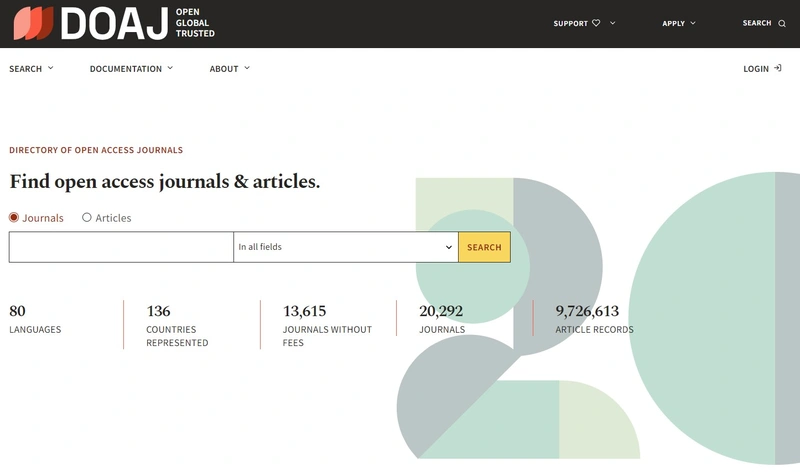Envision a world where academic achievements are universally accessible, free from financial barriers or institutional memberships. This is the core principle of open access—a transformative initiative aimed at democratizing the dissemination of knowledge and fostering a culture of open sharing and collaboration within the scholarly community. At the forefront of this movement stands the Directory of Open Access Journals (DOAJ), a community-curated online resource that meticulously catalogs and facilitates access to peer-reviewed journals committed to open access standards. DOAJ serves as a beacon for researchers, librarians, and publishers, providing a comprehensive database of high-quality, openly accessible academic journals across diverse disciplines.
The DOAJ plays a crucial role in advancing the open-access movement by establishing rigorous criteria for inclusion, and ensuring that listed journals adhere to best practices in open-access publishing. This includes transparency in licensing, copyright policies, and article processing charges (APCs). By providing this curated list, DOAJ not only helps researchers discover relevant open-access content but also assists funders and institutions in identifying compliant journals for their open-access mandates. As the landscape of scholarly communication continues to evolve, DOAJ remains at the forefront, addressing challenges such as predatory publishing and promoting sustainable models for open access. Through its efforts, DOAJ is instrumental in shaping the future of academic publishing, driving toward a more equitable and accessible global knowledge ecosystem.

What is DOAJ?
The Directory of Open Access Journals (DOAJ) serves as an extensive online directory that meticulously curates and indexes open-access, peer-reviewed journals across various disciplines. Founded in 2003, DOAJ has evolved into a global platform, promoting accessibility to scholarly content while upholding stringent quality standards.
At the crux of scholarly research lies a significant barrier: access. Conventional publication methods often restrict academic works with paywalls, posing a challenge for researchers, particularly those hailing from less affluent nations, to obtain vital information. Open access emerges as a beacon of hope, offering unimpeded entry to scholarly works. Yet, navigating the open-access domain can be complex. This is the role DOAJ has assumed.
Since its inception in 2003, DOAJ has been a lighthouse, directing researchers through the open-access terrain. It assists in identifying open access journals that maintain rigorous standards of academic integrity and publishing excellence. But the question remains: how does DOAJ accomplish this? Moreover, what are the advantages and dilemmas of open access? Let us delve deeper into these questions.
Picture entering an expansive library, where the shelves brim with a spectrum of books, each symbolizing a distinct domain of research and knowledge. Tucked in a corner stands a sign: "DOAJ: Your Compass to Open Access Journals." Drawn towards it, a wave of anticipation and inquisitiveness washes over you. This guide, laden with the wisdom and expertise of myriad professionals, is the key to a treasure of open access journals. Accessible to anyone with web connectivity, these journals serve as portals to the frontiers of research and avant-garde concepts. Navigating this extensive array of open-access journals with DOAJ as your compass, you embark on a journey of discovering novel viewpoints and broadening your horizons.
Open-access journals have sparked a paradigm shift in the accessibility and circulation of information. They have dismantled the gates that once confined the reach of knowledge, empowering academicians and researchers worldwide. As a pillar of the open access initiative, DOAJ exemplifies the profound impact of democratizing information. Within its database lies a wealth of journals across diverse fields, from science to the arts. Each journal signifies a collaborative drive to extend the frontiers of understanding, to stimulate discourse and debate, and to encourage collaboration amongst the intellectual community. Through DOAJ, the landscape of open access journals unfolds as a vibrant mosaic of scholarly pursuit, where ideas are exchanged liberally and innovation thrives without limit.
Navigating DOAJ: Unveiling its Features and Functions
DOAJ boasts a user-friendly interface equipped with powerful search functionalities. Users can explore a vast array of journals by employing filters such as subject, language, publication frequency, and geographical location, enabling tailored searches that cater to specific research needs.
DOAJ: An Overview and Criteria
The Directory of Open Access Journals, or DOAJ, is a not-for-profit organization that seeks to increase the visibility, accessibility, reputation, usage, and impact of quality open access, peer-reviewed research. It does this by providing an online directory that indexes open access journals which meet its rigorous selection criteria.
Not all open access journals make it into the DOAJ. The directory has stringent criteria designed to ensure that only the most reputable journals are indexed. These include the requirement for a journal to have an editorial board, to conduct a robust peer review process, and to have a high level of transparency in its operations, among others. Journals that meet these criteria are awarded the DOAJ Seal, a mark of certification that signals to researchers that the journal adheres to best practices in open access publishing.
The DOAJ's strict criteria not only ensure the quality of the journals it indexes but also serve to protect authors from predatory open access publishers. These are unscrupulous publishers who charge authors publication fees without providing the necessary editorial and publishing services. By using the DOAJ, researchers can have peace of mind knowing that they are dealing with legitimate, high-quality open access journals.
How to Use DOAJ
Using DOAJ is straightforward. The directory's user-friendly interface allows researchers to search for journals using a variety of criteria such as subject area, country of publication, and whether the journal charges a publication fee. Once a journal is selected, DOAJ provides comprehensive information about the journal, including its aims and scope, peer review process, and open access policy.
DOAJ also allows researchers to search for individual articles within the indexed journals. This feature is particularly useful for researchers who are looking for specific articles rather than browsing through entire journals. For those who want to stay updated on the latest developments in their field, DOAJ offers the option to create personalized email alerts based on their search criteria.
In addition to its search capabilities, DOAJ also provides resources and guidance for publishers, librarians, and researchers on open access best practices. These resources cover a wide range of topics, from how to start an open access journal to understanding the different types of open access.
The application guide on the DOAG website states that prior to initiating the application process, you will receive a prompt to either login or register. You have the option to save your progress and review all your answers before submitting them. Please be aware that the PDF version of the application form is solely provided for reference purposes.

Benefits of Open Access
Open access has numerous benefits, not least of which is the democratization of knowledge. By removing paywalls, open access enables researchers from around the world, regardless of their financial means, to access, use, and contribute to the global body of knowledge. This fosters a culture of collaboration and knowledge sharing, accelerating the pace of discovery and innovation.
Open access also enhances the visibility and impact of research. Research shows that open-access articles are more likely to be downloaded, cited, and shared, compared to articles behind paywalls. This can lead to greater recognition and career advancement for researchers.
Moreover, by giving the public access to research findings, open access can foster a more informed and engaged citizenry. This is particularly important in areas like health and environmental science, where public understanding can have a direct impact on people's lives.
Challenges of Open Access
While the benefits of open access are compelling, there are also challenges. One of the main challenges is financial sustainability. In the traditional publishing model, revenues from subscriptions and pay-per-view charges cover the costs of publication. In contrast, most open access journals rely on publication fees paid by authors or their institutions. This can create financial barriers for authors, particularly those from low-income countries.
Another challenge is quality assurance. The open access model has been exploited by predatory publishers who charge authors publication fees without providing necessary editorial services. Although DOAJ's strict selection criteria help to address this issue, it remains a concern for many researchers.
Lastly, there are challenges related to awareness and perception. Despite the growth of open access, many researchers are still unaware of it or have misconceptions about its quality. Changing these perceptions and raising awareness about the benefits of open access is a key challenge for the open access movement.
The Future of Open Access
The future of open access looks promising. More and more researchers are embracing open access, and prestigious funders and institutions are implementing open access policies. Innovations in scholarly publishing, such as preprint servers and open peer review, are further expanding the possibilities for open access.
However, to realize the full potential of open access, there needs to be a concerted effort to address the challenges it faces. This includes finding sustainable business models, enhancing quality assurance mechanisms, and educating researchers about the benefits of open access.
As the open access movement continues to evolve, DOAJ will undoubtedly play a crucial role. By providing a reliable guide to reputable open access journals, it will continue to empower researchers to share their work freely and widely, in the service of advancing knowledge and benefitting society.
FAQs:
What is the purpose of the Directory of Open Access Journals (DOAJ)?
The purpose of the Directory of Open Access Journals (DOAJ) is to serve as a comprehensive online directory that meticulously curates and indexes open access, peer-reviewed journals across various disciplines. Founded in 2003, DOAJ aims to promote accessibility to scholarly content while upholding stringent quality standards. It assists researchers in navigating the open access domain by identifying reputable open access journals that maintain rigorous standards of academic integrity and publishing excellence. Additionally, DOAJ provides a user-friendly interface with powerful search functionalities, allowing researchers to explore a vast array of journals and access comprehensive information about each journal, including its aims and scope, peer review process, and open access policy. Furthermore, DOAJ offers resources and guidance for publishers, librarians, and researchers on open access best practices. Overall, DOAJ plays a crucial role in empowering researchers to share their work freely and widely, advancing knowledge and benefiting society.
How does DOAJ accomplish its goal of promoting accessibility to scholarly content?
DOAJ accomplishes its goal of promoting accessibility to scholarly content through its rigorous curation and indexing process. It serves as a global platform that meticulously catalogs and indexes open access, peer-reviewed journals across various disciplines. DOAJ maintains stringent quality standards, ensuring that only reputable journals that adhere to best practices in open access publishing are included in its directory. This is achieved through the implementation of strict criteria, including the requirement for journals to have an editorial board, conduct robust peer review processes, and maintain a high level of transparency in their operations. Journals meeting these criteria are awarded the DOAJ Seal, signifying their commitment to quality and integrity in open access publishing. By providing a user-friendly interface with powerful search functionalities, DOAJ enables researchers to navigate the open access domain and access a wealth of scholarly works, thereby promoting accessibility to scholarly content.
What are the benefits and challenges of open access publishing?
Open access publishing holds significant benefits, democratizing knowledge and boosting research visibility and impact. It allows global access, fostering collaboration and innovation. Open access articles are more cited and shared, benefiting researchers' careers and informing the public, especially in vital fields like health and the environment. However, challenges exist. Financial sustainability, often reliant on author fees, can limit access. Quality control suffers due to predatory publishers, impacting credibility. Awareness and misconceptions among researchers pose hurdles. Overcoming these challenges is vital for fully realizing the advantages of open access publishing.
What is the potential future of open access and the role of DOAJ in it?
The future of open access holds great promise, with a growing number of researchers, prestigious funders, and institutions embracing open access policies. Innovations in scholarly publishing, such as preprint servers and open peer review, are further expanding the possibilities for open access. However, to fully realize the potential of open access, concerted efforts are needed to address challenges such as finding sustainable business models, enhancing quality assurance mechanisms, and educating researchers about the benefits of open access.
In this evolving landscape, the Directory of Open Access Journals (DOAJ) is positioned to play a crucial role. As a not-for-profit organization, DOAJ aims to increase the visibility, accessibility, reputation, usage, and impact of quality open access, peer-reviewed research. It achieves this by providing an online directory that indexes open access journals meeting rigorous selection criteria. DOAJ serves as a reliable guide to reputable open access journals, empowering researchers to freely share their work and contribute to the advancement of knowledge and society. By maintaining stringent criteria and awarding the DOAJ Seal to certified journals, DOAJ ensures that researchers can confidently navigate the open access terrain, accessing high-quality scholarly content. As open access continues to evolve, DOAJ's role in promoting accessibility to scholarly content and upholding quality standards will be instrumental in shaping the future of open access.
Read More:
Free Journal Publishing Guide for Researchers in Brieflands
Choosing the Right Journals: Guidelines for Publishing Research Articles
